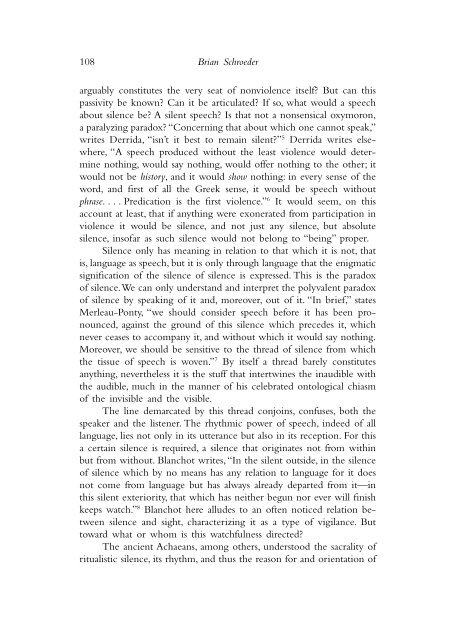Create successful ePaper yourself
Turn your PDF publications into a flip-book with our unique Google optimized e-Paper software.
108 Brian Schroeder<br />
arguably constitutes <strong>the</strong> very seat <strong>of</strong> nonviolence itself? But can this<br />
passivity be known? Can it be articulated? If so, what would a speech<br />
about silence be? A silent speech? Is that not a nonsensical oxymoron,<br />
a paralyzing paradox? “Concerning that about which one cannot speak,”<br />
writes Derrida, “isn’t it best to remain silent?” 5 Derrida writes elsewhere,<br />
“A speech produced without <strong>the</strong> least violence would determine<br />
nothing, would say nothing, would <strong>of</strong>fer nothing to <strong>the</strong> o<strong>the</strong>r; it<br />
would not be history, and it would show nothing: in every sense <strong>of</strong> <strong>the</strong><br />
word, and first <strong>of</strong> all <strong>the</strong> Greek sense, it would be speech without<br />
phrase. . . . Predication is <strong>the</strong> first violence.” 6 It would seem, on this<br />
account at least, that if anything were exonerated from participation in<br />
violence it would be silence, and not just any silence, but absolute<br />
silence, ins<strong>of</strong>ar as such silence would not belong to “being” proper.<br />
Silence only has meaning in relation to that which it is not, that<br />
is, language as speech, but it is only through language that <strong>the</strong> enigmatic<br />
signification <strong>of</strong> <strong>the</strong> silence <strong>of</strong> silence is expressed. This is <strong>the</strong> paradox<br />
<strong>of</strong> silence. We can only understand and interpret <strong>the</strong> polyvalent paradox<br />
<strong>of</strong> silence by speaking <strong>of</strong> it and, moreover, out <strong>of</strong> it. “In brief,” states<br />
Merleau-Ponty, “we should consider speech before it has been pronounced,<br />
against <strong>the</strong> ground <strong>of</strong> this silence which precedes it, which<br />
never ceases to accompany it, and without which it would say nothing.<br />
Moreover, we should be sensitive to <strong>the</strong> thread <strong>of</strong> silence from which<br />
<strong>the</strong> tissue <strong>of</strong> speech is woven.” 7 By itself a thread barely constitutes<br />
anything, never<strong>the</strong>less it is <strong>the</strong> stuff that intertwines <strong>the</strong> inaudible with<br />
<strong>the</strong> audible, much in <strong>the</strong> manner <strong>of</strong> his celebrated ontological chiasm<br />
<strong>of</strong> <strong>the</strong> invisible and <strong>the</strong> visible.<br />
The line demarcated by this thread conjoins, confuses, both <strong>the</strong><br />
speaker and <strong>the</strong> listener. The rhythmic power <strong>of</strong> speech, indeed <strong>of</strong> all<br />
language, lies not only in its utterance but also in its reception. For this<br />
a certain silence is required, a silence that originates not from within<br />
but from without. Blanchot writes, “In <strong>the</strong> silent outside, in <strong>the</strong> silence<br />
<strong>of</strong> silence which by no means has any relation to language for it does<br />
not come from language but has always already departed from it—in<br />
this silent exteriority, that which has nei<strong>the</strong>r begun nor ever will finish<br />
keeps watch.” 8 Blanchot here alludes to an <strong>of</strong>ten noticed relation between<br />
silence and sight, characterizing it as a type <strong>of</strong> vigilance. But<br />
toward what or whom is this watchfulness directed?<br />
The ancient Achaeans, among o<strong>the</strong>rs, understood <strong>the</strong> sacrality <strong>of</strong><br />
ritualistic silence, its rhythm, and thus <strong>the</strong> reason for and orientation <strong>of</strong>
















